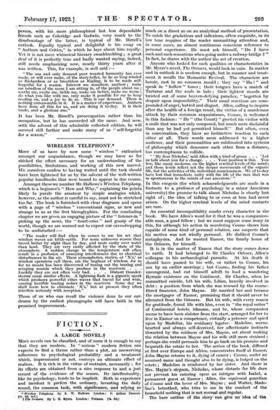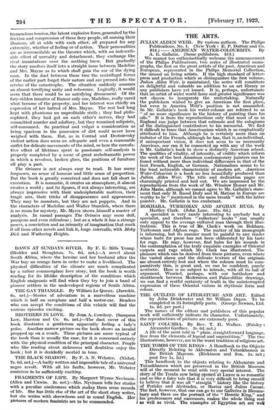FICTION:
A LARGE NOVEL.} MOST novels can be classified, and of some it is enough to say that they are modem. In " serious " modern fiction one expects to find a theme rather than a plot, an unswerving adherence to psychological probability and a treatment which, impressionist or not, conveys an ultimate effect of realism. It is rich in the virtue of restraint, necessarily ; for its effects are obtained from a nice response to and a just record of the evidence of the senses. Its intellectuality, like its psychology, tends to be implicit. Both in experience and incident it prefers the ordinary, investing the daily round, the common, task, with significance, and relying as
• Wireless Telephony. By B. W. Hallows. London: 0. Arthur Pearson. - Vs. ed. net.] t Tile Orissers. By L. H. Myers. London: Putnam. [7a. 6d.J
much on a direct as on an analytical method of presentation. To catch the gradations and inflexions, often exquisite, in its low tone requires of the reader unremitting attention and, in some cases, an almost continuous conscious reference to personal experience. He must ask himself, " Do I have such and such sensations when going under a railway-bridge 4 " In fact, he shares with the author the act of creation.
Anyone who looked for such qualities or characteristics in Mr. Myers's novel, The Orissers, would look in vain. In matter and in outlook it is modern enough, but in manner and treat- ment it recalls the Romantic Revival. The characters. are heroic, cast in no common mould ; they say " Ha 1" and speak in " hollow " tones ; their tongues have a snatch of Tartarus and the souls in bale ; their lightest moods are twisted out of some heaven-defying paradox, " begotten by despair upon impossibility." Their usual reactions are com- pounded of anger, hatred and disgust. Allen, calling to inquire after the health of a foreign count, the victim of a Murderous attack by their common acquaintance, Cosmo, is weleoMed in this fashion : " He " (the Count) " greeted his visitor with a smile that was not only composed, but much more disdainful than any he had yet permitted himself." But often, even in conversation, they have no instinctive reaction to each other at all. Their words seem addressed to a higher audience, and their personalities are sublimated into systems of philosophy which denounce each other from a distance,
too contemptuous to collide.
" ` My dear Nicholas,' said Allen with a kind of hrroan . .Let us talk about you for a • change. . . Your position is this.. You live, like many moderns, on the higher cerebral levels of the mind; and those levels reflect not the deeper movements of the organic life, but the activities of the individual consciousness. We of to-day have lost that immediate unity with the life of the race that was so spontaneous in the minds of our ancestors.' " In this exegesis (for which acknowledgments are made in a footnote to a professor of psychology in a minor American university) the promise to talk about Nicholas is clearly lost sight of ; the idea • of talking to or even at him had never arisen. On the higher cerebral levels of the mind contacts are rare.
An essential incompatibility marks every character in the book. We have Allen's word for it that he was a companion- able man, a good fellow ; but we must suppose some irony in this, for although his action in murdering Cosmo shows him capable of some kind of personal relation, one suspects that his motive was not wholly personal. He disliked Cosmo's metaphysics. And he wanted Eamor, the family home of the Orissers, for himself.
It is in the matter of Eamor that the story comes down to earth. It had belonged to Sir Charles Orisser, Allen's colleague in his archaeological pursuits. At his death it should have passed to his wife, or rather to Cosmo, his son by an earlier marriage ; but Cosmo, finding his father uncongenial, had cut himself adrift to lead a wandering Byronic existence on the Continent. Sir Charles, when he committed suicide, left his wife, Lilian, heavily involved in debt : a position from which she was rescued by the coarse- fibred financier, John Mayne. He married her and became the mortgagee of Eamor, promising that it should never be alienated from the Orissers. But his wife, with every reason for gratitude, found life with him, even in "the royal suites" of Continental hotels, irksome, and he, whose compassion seems to have been sinister from the start, arranged for her to live in Eamor on a competence, virtually a prisoner and spied upon by Madeline, his residuary legatee.: Madeline, warm- hearted and always self-deceived, her affectionate instincts thwarted by the coldness of Mrs. Mayne, set about making the relation between Mayne and his wife still more strained : perhaps she could persuade him to go back on his promise and bequeath the estate to her. The action of the book, diffused at first over Europe and Africa, concentrates itself at Eamor. John Mayne returns to it, dying of cancer ; Cosmo, under an assumed name and thought also to be dying, is lodged on the
estate ; Madeline is reinforced by her sister. And there is Mrs. Mayne's stepson, Nicholas, whose distaste for life, does not prevent his entering upon an intrigue with Isabel, a permanent guest at Eamor ; Allen, the equivocal guardian of Cosmo and the lover of Mrs. Mayne ; and Walter, Made- line's betrothed, who tries to see in the conduct of the household nothing that is not normal and regular. The bare outline of the story- can give no idea of the tremendous tension, the latent explosive force, generated by the friction and compression of these fiery people, all nursing their illusions, all at odds with each other, all prepared for any extremity, whether of feeling or of action. Their personalities are as irreconcilable as the theories which, with an indescrib- able effect of unreality and detachment, they exchange like rival incantations over the seething brew. But gradually the story resolves itself into a straight issue between Madeline and Mrs. Mayne as to which shall gain the ear of the dying man. In the duel between these two the centrifugal forces of the earlier part forget their nature and are pressed into the service of the catastrophe. The situation suddenly assumes an almost terrifying unity and coherence. Logically, it would seem that there could be no satisfying denouement. Of the fury-ridden inmates of Eamor only one, Madeline, really cared what became of the property, and her interest was chiefly an expression of her hatred of Mrs. Mayne. The rest had long kept with phantoms an unprofitable strife ; they had philo- sophized, they had got on each other's nerves, they had committed murder and adultery, but they remained solipsists, self-consumed. So practical and vulgar a consideration as being spacious in the possession of dirt could never have weighed with them. But, as in Conrad and Dostoievsky violent action does seem an adequate and even a reasonable outlet for delicate movements of the mind, so here the cumula- tive effect of lifetimes spent in passionate self-analysis is properly completed by a scene of great melodramatic power in which a revolver, broken glass, the positions of furniture all play a part.
The Orissers is not always easy to read. It has many longueurs, no sense of humour and little sense of proportion. But the book is greatly conceived and does not fall short in execution. It is romantic, it creates an atmosphere, it almost creates a world ; and its figures, if not always interesting, are always impressive with their undecipherable motives, their tragic airs, their tricks of disappearance and appearance. They may be monsters, but they are not puppets. And in the characters of Madeline and Walter Standish, where there is no room for mystery, Mr. Myers Shows himself a master of analysis. In casual passages The Orissers may seem dull, pompous and even ridiculous ; but as a. whole it has a strange power, a conviction and an intensity of imagination that mark it off from other novels and link it, Longo interval°, with Moby Dick and Wuthering Heights.











































 Previous page
Previous page